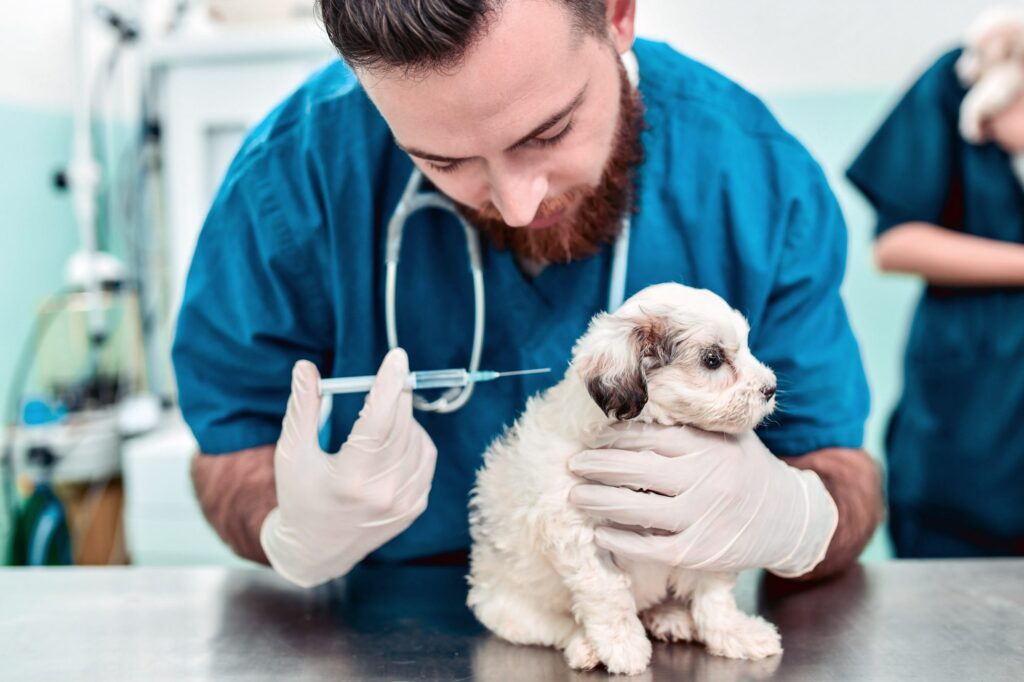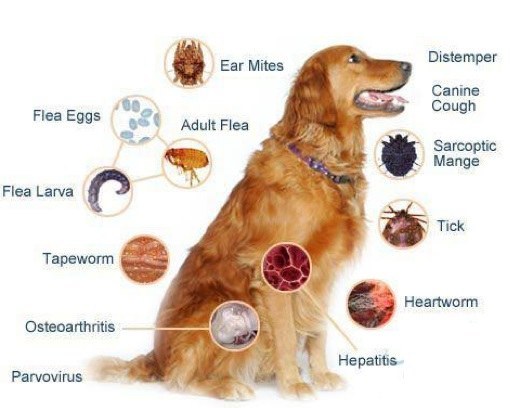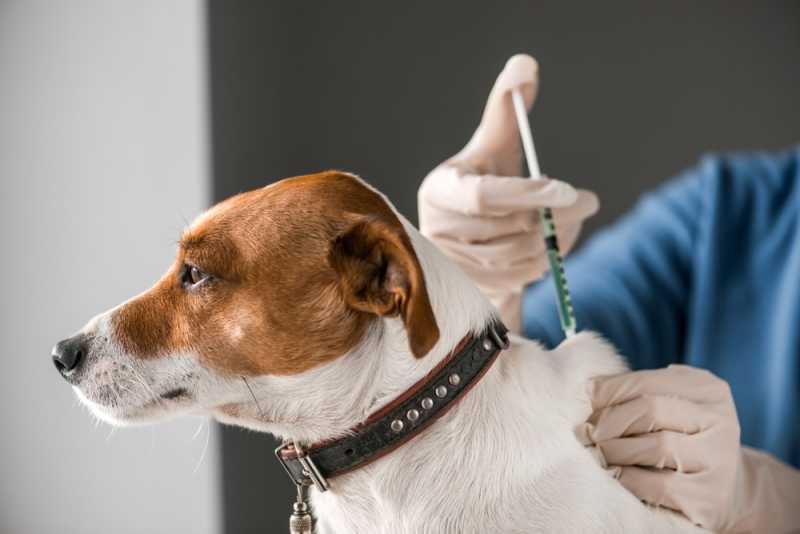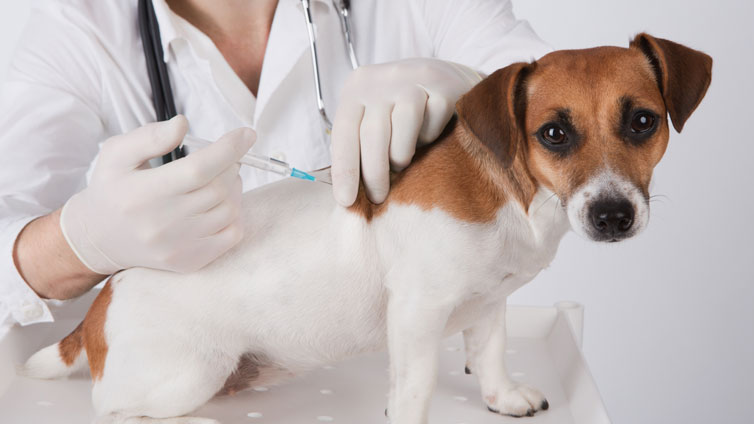If your dog has never been vaccinated and you are not sure about puppy vaccination prices and scheduling, then just know it’s critical you have it done. There are many places where you can get your dog shots, including petco, petsmart, or even online. The important thing is to get them done.
The good news is that it’s now very convenient and affordable, as there are many low cost pet shots online to buy from as well as pet care discount plans that help pay for the vaccines and the vet who administers them. Which is something that pet insurance does not cover (unless you have one with a wellness plan like ours).
I can’t emphasize this enough. Weather this is your first brand new puppy or your third, getting a pet savings program will save you a lot of money throughout the life of your pupper. Its why its on our puppy checklist of services you need to get.
It’s not some insurance form you have to wait to get reimbursed, or a list of what gets covered and what doesn’t. It’s a straightforward 25% off whatever the vet bill is and any meds/supplies they charge you. I have Pet Assure vet savings plan, as do many of my friends. It’s well worth it.
All of this has helped bring the price down as competition for dog medications has been fierce. But where should you buy them from is another question as quality of your puppy’s meds matter.
Contents
Where To Buy Pet Meds Online
First of all, let’s address the main concern here… can you buy dog vaccines online? absolutely.
The more important question to ask is where to buy dog vaccines online? That’s easy! the best place to buy dog medicine online is Revival Health and PetCareRX (combine it with PetAssure membership and you get an extra 15% off. You see what I mean?).
They have one of the most knowledgeable staff and comprehensive selection of meds and supplements for your pup. Better yet, they know how to handle shipping in a timely manner as that’s key in getting your meds in a usable condition.
Plus, they have more than just meds for dogs, they also buy pet vaccines online from their site. And yes, it is safe to order puppy vaccines online.
Here is just a sample list of meds you can buy online and save:
- Parvo
- Antibiotics
- Kennel cough
- Influenza
- DA2PPv
In Canada, your best option is CanadaPetCare.com they are very reputable and ship from Canada, so your meds would be in a healthy condition.
If you are from Australia or the UK, Pet Care Supplies is an excellent choice as well.
No matter what, just make sure to buy it from a good and reputable company that’s been around and is not a fly by night operation. The ones above are one of the best places I would feel comfortable buying medicine online and actually giving their medication to my dog.
Now, let’s go over the numbers.
Puppy Shots Cost
How much do puppy shots cost?
We provided a sample puppy vaccination cost table below as a reference. Prices can change and vary from location to location, so always check with your clinic for their prices. That being said, remember, if you want to fight the rise of veterinary care costs the best thing you can do is to either get a pet savings plan or puppy insurance that comes with a wellness plan like this one.
| Scheduled Vaccine | Cost |
|---|---|
| 6 – 8 Weeks | |
| Fecal Test | $15 |
| 1st Distemper Parvo/Corona, (7-1) Vaccination | $27 |
| De-worming (If Needed) | $11* |
| 9 – 11 Weeks | |
| 2nd Distemper Parvo/Corona, (7-1) Vaccination | $27 |
| De-worming (If Needed) | $11* |
| 1st Heartworm Prevention Tablet | $6* |
| 12 – 15 Weeks | |
| 3rd Distemper Parvo/Corona, (7-1) Vaccination | $27 |
| 1st Bordetella | $18 – $22 |
| 2nd Heartworm Prevention Tablet | $6* |
| 16 Weeks | |
| 4th Distemper Parvo/Corona, (7-1) Vaccination, Rabies | $41 |
| 2nd Bordetella | $18 – $22 |
| 6 months supply of Heartworm Prevention | $35 – $150 |
| License (If Applicable) | $6 – $18 |
| *Depends on Lab results. |
You have two options on lowering the costs of vaccinations:
Option 1 (Recommended)
As mentioned above, get the Pet Assure discount savings plan. Most vets accept it and every day more join their network. It just makes sense as it’s a win win for everyone. You get a 25% discount on supplies, treatments, and labs, among other things, without the need to fill out any forms or spend time shopping around for cheaper alternatives.
Its pretty cheap too, about $99/year for your dog. Almost like a AAA plan for pets as they even have partnerships with other pet care companies to give you extra benefits and discounts. It’s a great option and even better when combined with pet insurance as it helps pay on what insurance doesn’t cover such as pre-existing conditions and routine care and vaccines.
Option 2
If you already have a good pet insurance, check to see if they have an upgrade package to help cover vaccine costs, this way these routine care expenses will be covered. If you don’t, we recommend Embrace, they are very affordable, and also what we have for our dogs.
A routine care package has many benefits such as :
- Reduce the cost of vaccinating your dog.
- Help cover costs of any medical complications from the shots.
- Peace of mind.
They are the only company I know of that has a one and is well worth requesting more information on how you can use their preventative care package to save on your pup’s meds.
Should I vaccinate my dog?
Thankfully, we live in a world where many animal diseases are preventable. It wasn’t that long ago where many dogs didn’t live to see six months of age because of these widespread diseases.
Even though there is quite a bit of controversial beliefs on pet vaccinations. It is quite clear that modern medical advancements have wiped out these deadly diseases to help your puppy live a long life.
Besides regular vaccination, there are many foods to boost your dog’s immune system. A healthy diet is key for a strong healthy immune system. We tried many diets and found a combination of raw and fresh homemade cooked food to be the best for our pup.
If you are asking when puppies can eat solid food, well that’s easy. Usually after they are 4 weeks old. It’s the time when they are not getting all their nutrition they need from their mother’s milk.
Keeping your dog’s immune system strong is the best way to prevent him from getting sick in the first place. And properly vaccinating your puppy will ensure you not only protect their health, but you protect the health of your local canine community, too.
But if money is an issue, know that you can get your dog vaccine supplies from Revival Health to cover all your pet’s routine care including any syringes, booster shots, and other related RX expenses. Just ask you veterinarian to write you a prescription and let them know you will get the meds online. It will save you a lot of money.
If a vet visit is out of your budget at any point, you can find low-cost pet vaccinations in a few clinics at the recommendation of your local veterinarian.
Vaccines are an affordable way to avoid thousands of dollars in future veterinary costs.
How much is a parvo shots?
$27 each shot. Can’t afford it? Consider this, did you know that average hospitalization costs for parvo virus can easily exceed $1,200? For the cost of a few vaccines, you could be saving money and your puppy’s life. But if you are still having difficulty paying your vet bills there are alternatives available.
Many well-meaning owners consider giving their own vaccines to save money or avoid the stress of a veterinary visit. While this practice has been occurring for decades, many veterinary professionals warn against doing this. It isn’t a matter of you not knowing how to give a vaccine, but more about the efficacy of store-bought vaccines.
Vaccines have a specific handling and storage procedure that ensures the vaccines aren’t damaged. A damaged vaccine won’t give an animal any immunity, meaning you’re banking on protection that hasn’t occurred.
Temperature safety:
- Vaccines should be kept at 40 degrees Fahrenheit at all times.
- When they’re removed from the refrigerator, they should immediately be administered.
This 40 degree guideline means from the moment they’re made to the time they’re administered, they need to be kept at this temperature for best results.
When vaccines are transported or stored by untrained people, it’s not uncommon for them to be left out in the sun on shipping docks or stored for prolonged periods of time in hot trucks as they’re transported.
This increased heat can kill the vaccine, so it provides no immunity to your dog.
The best practice is to always have a veterinarian administer the vaccine, just see it as part of the cost of dog ownership. You’re then guaranteed the vaccines have been stored properly at all times and they’re providing your dog with the best immunity possible.
Puppy Vaccination Schedule

A puppy vaccine schedule is easy to keep up on, especially with right record keeping charts. It doesn’t require any more than six veterinary visits if the vaccines are administered properly and on time.
When do puppies need shots?
- 6 weeks – First set
- 11 weeks – Second set
- 14 weeks – Third set
- 16 weeks – Rabies vaccination
At 6 Weeks
Your puppy’s first vaccines should have taken place with their breeder/rescue at about six weeks of age, seven at the latest. The vaccine administered is typically a combination vaccine and consists of distemper, adenovirus, parvo, and usually parainfluenza. On your records, the acronym will look something like DHPP (distemper, hepatits, parvo, parainfluenza).
At 11 Weeks
The next set will occur two to three weeks after the first set, not to go past the nine week mark. So this means if you acquire your puppy at eight weeks, you should immediately call your veterinarian to schedule their first appointment and share your puppy’s current vaccine history. The vaccine given at the eight or nine week mark is another combination vaccine of DHPP.
At 14 Weeks
A month after the second set, your puppy should be given their third DHPP at about 12 weeks. At this point, your veterinarian may wish to introduce vaccines for other regional diseases like leptospiroris or lyme disease. Your veterinarian will be the best adviser on what’s appropriate for your puppy.
At 16 Weeks
Finally, at four months of age (16 weeks), your puppy will be given their final combination DHPP. You have probably been getting warnings from your veterinarian about not taking your puppy to parks until they’ve gotten their final DHPP.
This part of the puppy shots schedule is very important to remember: It takes at least 14 days for your puppy to develop an immune response to the vaccine and form antibodies.
When you leave the clinic with that final combination, don’t immediately take your dog to the dog park. They aren’t fully protected yet. Wait at least two weeks after the final shot before you treat your dog like he’s fully and completely vaccinated.
At four months, your vet might administer the rabies vaccine, but some vets may give it at 12 weeks of age. This can depend on the prevalence of rabies in your area or what the area’s local laws are regarding rabies vaccines.
Remember that rabies vaccines are only recognized by law if they’re given by a licensed veterinarian or their assistant.
What Shots Do Puppies Need?

Help prevent these dog diseases and vaccinate your pup.
The American Animal Hospital Association (AAHA) recommends that puppies get a series of four core vaccinations. These are the same regardless of where you live, how old your puppy is, or what kind of puppy it is.
Canine adenovirus
Canine adenovirus can present in two ways. Canine adenovirus-1 begins in the dog’s tonsils about a week after the dog comes into contact with respiratory secretions of an infected dog.
What happens next is this:
- Symptoms of type 1 begin with a dry hacking cough that produces a white foam.
- As the virus spreads throughout the body, it begins to target the liver cells.
- As it progresses, the dog will start to experience a painful abdomen, fever, lethargy, and vomiting.
- When it’s in the liver, the virus will then be shed through the feces and urine.
Healthy dogs can beat the virus in 10 to 14 days but may require veterinary care to manage any pain or vomiting/diarrhea.
It’s important to remember, though, that a dog that’s had the virus will be contagious for at least six months. During this time, the dog should not leave the house or come into contact with unvaccinated puppies.
Canine parvovirus

Canine parvovirus is the big daddy of puppy illnesses. Parvo is a virus that attacks the lining of a dog’s intestine. When it does, the intestinal lining begins to die and produces a foul-smelling bloody diarrhea. The puppy will have near constant diarrhea and vomiting. They lose their appetite, they can’t keep any water down, and they have virtually no energy.
Secondary infections are common because their immune systems are so depleted. The only way for a puppy to successfully survive parvo is hospitalization with IV fluids and antibiotics.
Home treatments are almost always unsuccessful.
A puppy whose parvo is caught early and hospitalized immediately has a good chance of survival. If the puppy is untreated for even a few days, their chances of survival are greatly reduced.
Distemper
Distemper affects a dog’s organs. The organs affected can include the skin, eyes, and lungs. The virus is transmitted through coughing and urine, generally when a dog sniffs infected urine.
Initial symptoms are as innocuous as a runny nose, but quickly progress to vomiting, diarrhea, a severe cough, and even seizures.
Distemper is highly contagious, especially in kennel settings. Dogs who aren’t vaccinated will almost always contract distemper if they’re exposed to it, while puppies and elderly dogs are most likely to pass away despite treatment.
Dogs that do survive don’t come out on the other side unscathed; puppies will have permanent enamel damage, and dogs of any age can suffer permanent damage to their vision or nervous systems.
Treatment is merely supportive care: Use IV fluids and medications to treat any secondary infections or symptoms.

Rabies vaccine.
Rabies
Rabies is the final core vaccine and the only one required by law. Many people like to give their own vaccines, but rabies won’t be recognized by law if your dog get vaccinated by anyone other than a licensed veterinarian and their techs. It’s a common misconception that rabies has been eradicated, but it is still very much in existence.
The rates have lowered, yes, but there are still quite a few cases reported every year. Because of the idea of rabies being eradicated, many people don’t vaccinate their animals.
Rabies has a 100% fatality rate; there is no treatment that can save a dog from rabies. The only way you can protect your dog from this truly awful disease is by vaccination.
There are other dog vaccinations to consider, but just those few above are the core requirement. Unfortunately there are many dog owners that are not concerned with the question what shots does a puppy need.
Additional Dog Vaccines
I know what you are asking… how many shots do puppies need!?
There are a few other vaccines that you can choose to have your puppy vaccinated for that are not required. Your veterinarian will recommend what’s appropriate for your area.
Parainfluenza
Parainfluenza is commonly given in conjunction with distemper, adenovirus, and parvo. It’s a very contagious respiratory tract virus that presents with a cough, fever, nasal discharge, and lethargy. Dogs that come from a shelter or rescue environment are the most common victims of this disease, as are dogs that are boarded with unvaccinated animals.
Leptospirosis
Leptospirosis is a bacterial disease spread by wildlife through their urine and found in water sources like puddles, streams, and lakes. Unlike the previously mentioned diseases, leptospirosis is contagious to humans, especially children and the elderly. It directly attacks the dog’s kidneys, meaning their urine becomes highly contagious.
The bacteria typically enters through a cut on the skin on both humans and animals. Sporting dogs, hunting dogs, dogs who go hiking, or farm dogs are most likely to come in contact with leptospirosis.
Treatment requires extensive hospitalization and if the dog survives, they may have permanent kidney damage or be contagious for months after they’ve come home.
This long period of being contagious makes it extremely difficult for families with children. The dog has to be handled with gloves and anywhere they urinate has to be carefully disinfected with bleach.
Maternal Antibodies

A golden retriever & her pups.
There are a lot of myths surrounding the maternal antibodies that puppies are born with. Some people mistakenly believe their dog is protected much longer than they actually are. But, there are a lot of factors that go into how long a puppy is protected by his mother’s antibodies.
Maternal immunity is also known as passive immunity, meaning the body gained antibodies without doing any work.
In a nutshell the process goes like this:
- The puppies will get immunity from their mother through her colostrum, the fluid she excretes before her actual milk comes in.
- The colostrum flows for 36 to 48 hours after birth and is rich with antibodies, nutrients, electrolytes, and vitamins.
- Puppies who don’t get colostrum before they hit the two day old mark don’t get the antibodies because their intestines stop absorbing the antibodies 48 hours after they’re born.
How long they’re protected depends on how many antibodies their mother has.
Because a mother’s antibody levels will vary with each dog, there’s no way to accurately say that a puppy is immune for a specific length of time. Because of this, it’s critical to follow a general dog vaccination schedule to give them the best chance at protection.
Does Pet Insurance Cover Vaccines?
The short answer is kind of, let me explain. There are quite a few options in pet insurance that covers vaccinations and other preventable care treatments.
The best combo is to get a pet discount plan which would save on all your pet’s medical expenses regardless of the type of insurance you get. This way you will be covered every which way. Some insurance companies have a preventable care package as an add-on option but its not as straightforward as svet discount plan. So it’s good to have both. Plus, if you have multiples pets, it gets way cheaper and more affordable.
Many don’t get insurance until after their dog gets all the necessary vaccinations, in our opinion that’s a mistake. The first year can be quite a roller coaster ride of medical expenses, including accidents (which many puppies are prone to).
So save yourself from the unnecessary emotional stress and get coverage for your dog early. And if it’s one of the pet plans that give you an allowance for vaccinations, even better.
To make things easier for you, we listed, in no particular order, each of the top insurance companies that has some kind of preventable care coverage option for your puppy:
- Embrace – You would need to get their Wellness Rewards Plan in addition to you policy. It’s like a health savings account for pet. Plan can cost anywhere from $20 to $60 additional dollars a month to your policy depending on the amount of annual allowance you want to be reimbursed for. Cover starts when your dog is over 6 weeks. So you could take advantage of the full vaccine schedule if necessary.
- PetPremium – Does have a preventative care option that can be added to your monthly insurance premium from $10-$25. Each option has its own list of what extra care it covers. I personally would go with the Prime choice has its the least hassle and most coverage at a pretty affordable price.
- Healthy Paws – No preventative care or wellness program provided. However, considering they are one the most affordable plans out there, the extra savings from the monthly costs can be deposited to a pet savings account and used for routine care when needed.
- Pets Best – They have two wellness programs. EssentialWellness $16/mo and BestWellness $26/mo. Depending on your selection, they will cover all types of routine care including vaccinations, spay/neuter, microchip and many more. Cover starts after 7 week age. So get those early vaccines done as quickly as you get either plan.
- Trupanion – Does not cover vaccines or routine care like flea treatments. This is both their plans in the USA and Canada.
Having 3 picks isn’t bad considering that they are quite different from each other allowing you to make a more personal decision based on your financial situation.
We have Embrace Insurance for our doggo Casey. It’s been great for us and we have minimal worries whenever there are any medical or general care expenses for our German Shepard.







